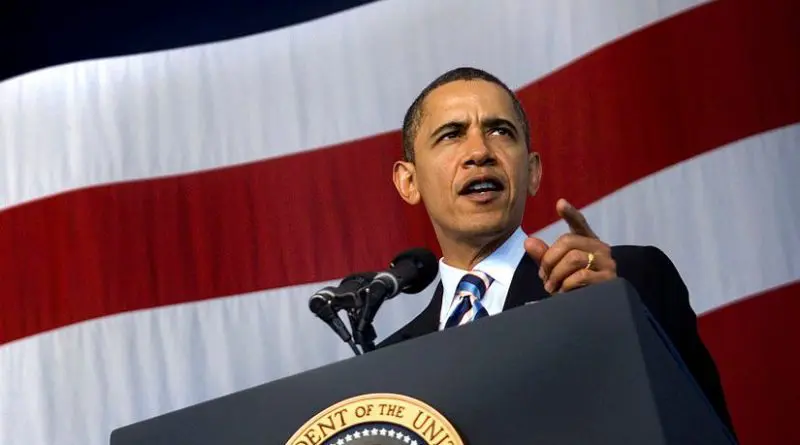Delegitimising Osama’s Ideological Legacy – Analysis
By Mohamed Feisal Bin Mohamed Hassan and RSIS
The death of Osama Bin Laden will not end Al Qaeda-inspired terrorism. The next battle should focus on the delegitimisation of Osama’s ideological legacy.
By Mohamed Feisal Bin Mohamed Hassan
NOW THAT news of Osama bin Laden’s death has reverberated around the globe, what is the ideological legacy of Osama – or bin Laden as some called him — and his creation, Al Qaeda? There are two key components of his legacy which has successfully projected his image, message and cause and turned him into a global symbol of contemporary terrorism. The two components are Osama’s ability to deconstruct the institution of fatwa, or religious edicts, and his controversial strategy of legitimising violence in the name of the Muslim faith.
Deconstructing the institution of fatwa
In harnessing a culture of hatred toward the West within the Muslim community, Osama used the instrument of fatwa. According to Sheikh Ali Gomaa, the Mufti of Egypt and a leading religious scholar in the Sunni Muslim world, fatwa is “a legal opinion issued by an expert (mufti) demonstrating a ruling within Islamic law based on evidence as a response to a question”. For centuries, the fatwa has been an instrument which provides guidance on theological queries submitted to legal religious authority or the Mufti. It is formulated through careful analysis of religious texts backed by deep knowledge of a fatwa’s applicability in the context of time and place.
The institution of the Mufti which expounds the fatwa holds an important place in preserving the sanctity of the Islamic message itself. Because of his exalted position in Islamic jurisprudence, a Mufti must possess several important attributes before he can legitimately issue a fatwa. He must have the authority to issue a fatwa; he must have the requisite knowledge of the Shari’ah (Islamic law); he must be intelligent, possess a creative imagination and be just and upright.
Though not qualified to issue fatwa, Osama began to do so in the mid 1990s principally calling for war against the US. His first fatwa in 1996 was entitled “Declaration of War against the Americans Occupying the Land of the Two Holy Places” (referring to the US forces in Saudi Arabia). His second in 1998 was co-signed with Ayman al-Zawahiri, head of Jihad Group in Egypt, Ahmed Refai Taha of al-Gama’a al-Islamiyya (in Egypt), Mir Hamzah of the Jamiat Ulema-e-Pakistan, and several other Islamic terrorist groups, was a declaration of war against the Crusaders and Jews (referring to the Israeli occupation of Palestine). Both documents appeared initially in the Arabic-language London newspaper Al-Quds Al-Arabi.

Osama’s ability to issue fatwa and use the media effectively to propagate them has the effect of de-constructing the institution of fatwa. Yet, as many biographers of Osama have contended, he has never had a rigorous Islamic education, let alone trained as a Mufti. To curtail such misrepresentation and deconstruction, Muftis and mainstream Muslim religious scholars globally face a critical task of educating the masses on the principles and prerequisites – indeed the entire science — behind the institution of fatwa.
Legitimising Violence
The readiness to co-opt violence is central to Osama’s resort to fatwa. His violent narrative has been structured on the basis of a faulty and incorrect interpretation of the Quran, supported by his adaptation of the Hadith (Sayings) of the Prophet. His rhetoric is based on an idiosyncratic cut-and-paste methodology of extracting the message of the Quran through his lens of violence. This violent paradigm was a reflection of his personal grievances and hatred fuelled by political goals and quest for survival. This resulted in Osama’s ability to legitimise violence in his misinterpretation of Islam. This fatal act, borne out of ignorance of the foundation of the Islamic intellectual heritage, has resulted in shaping a generation of radicalised individuals who submitted to his global call for violent suicidal resistance against tyranny.
Such violent interpretation of Islam’s message, however, has its adherents, sympathisers and supporters around the globe. This narrative has led to two distinct but conflicting outcomes. On the one hand, Osama-inspired individuals and groups have mushroomed around the globe from cyber chat rooms to publications. On the other, many Muslim religious scholars globally have condemned and delegitimised Osama’s narrative. Rehabilitation and prevention strategies are taking shape today in challenging his doctrine of violence. Interestingly, the current uprisings in the Arab world has shown that violence as perpetrated by Osama and Al Qaeda is not the norm in challenging the status quo, political grievances and injustices.
Whither Al Qaedaism?
From the many cases of Al Qaeda-inspired radicalisation and terrorism today, Osama is indeed the face and image of resistance, intolerance and violence. His idolised nature has been caricatured into the hearts and minds of the radicals. Will the post-Osama era see the end of Al Qaeda-inspired terrorism? The future should be dedicated to curbing and defeating Al Qaedaism. Central to this will be the delegitimisation of Osama’s ideological legacy.
Mohamed Feisal Bin Mohamed Hassan is a Senior Analyst with the International Centre for Political Violence and Terrorism Research (ICPVTR) at the S. Rajaratnam School of International Studies (RSIS), Nanyang Technological University. He is also a secretariat member and counselor of the Religious Rehabilitation Group (RRG) which provides religious counseling to Jemaah Islamiyah (JI) detainees in Singapore.

